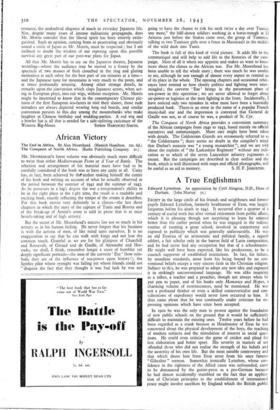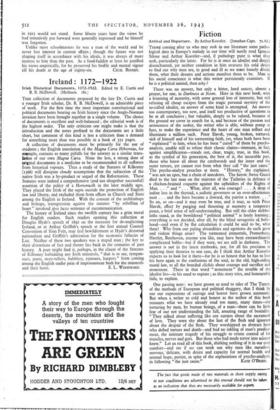A True Englishman
Edward Lyttelton. An appreciation by Cyril Alington, D.D., Dean of Durham. (John Murray. 5s.)
EXCEPT in the large circle of his friends and neighbours and former pupils Edward Lyttelton, formerly headmaster of Eton, was largely forgotten before his death in 1942. It occurred after a quarter of a century of useful work but after virtual retirement from public affairs, which it is pleasing though not surprising to learn he enjoyed better than the earlier period when he was engaged in the tedious routine of running a• great school, involved in controversy and exposed to publicity which was generally unfavourable. He was an oy Etonian of an aristocratic and political family, a superb. athlete, a fair scholar only in the barren field of Latin composition,: and he had never had any occupation but that of a schoolmaster.. He might well have been expected, like his predecessor, to be a staunch supporter of established institutions. In fact, his failure, by mundane standards, arose from his being bound by no con- ventional beliefs except a very sincere faith in the Christian religion. Subject to this, he was prepared to adopt any new idea and expound it in strikingly unconventional language. He was alike inspiring as a talker, a teacher and a preacher, though not always when he put pen to paper, and of his books only Memories and Hopes, a charming volume of reminiscences, need be mentioned. He was not a profound thinker or even a skilled controversialist and con- siderations of expediency would never have occurred to him. It thus came about that he was continually under criticism for ex- pressing opinions which have since been accepted.
In 1920 he was the only man to protest against the foundation of new public schools on the ground that it would be sufficiently difficult to maintain the existing ones. Twelve years before he had been regarded as a crank because as Headmaster of Eton he was concerned about the physical development of the boys, the teaching of modem subjects and the stimulation of interest in social ques- tions. He could even criticise the game of cricket and plead for less elaboration and better sport. His severity in matters of sex offended those who did not realise the strength of his beliefs and the austerity of his own life. But the most notable controversy, and that which drove him from Eton arose from his once famous " Gibraltar " sermon. Somewhat ironically Lyttelton, whose con- fidence in the rightness of the Allied cause was unbounded, came to be denounced by the gutter-press as a pro-German because he had almost accidentally stumbled on the fact that an applica- tion of Christian principles to the establishment of international peace might involve sacrifices by England which the British public
in 1915 would not stand. Some fifteen years later the views he had tentatively put forward were generally expressed and he himself was forgotten.
Unlike most schoolmasters he was a man of the world and he never lost interest in current affairs ; though the future was not shaping itself in accordance with_his ideals, it was always of more interest to him than the past. As a food-faddist at least he justified his views empirically, for he preserved his bodily and mental vigour
till his death at the age of eighty-six. CECIL BINNEY.



























 Previous page
Previous page